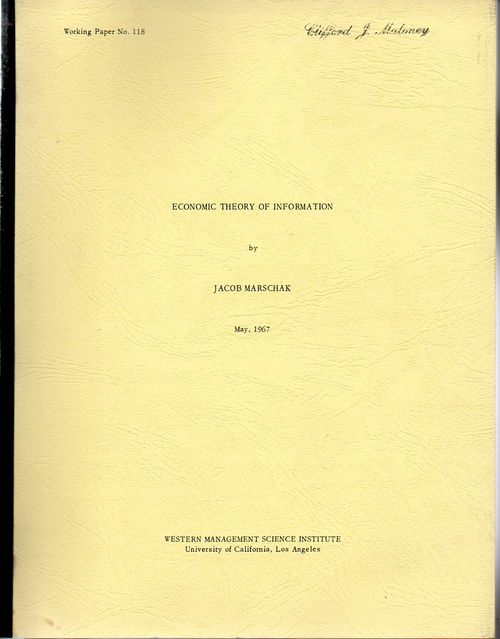MARSCHAK, JACOB. 5 works, all printed by Western Management Science Institute, University of California, Los Angeles. All 10x8 inches, perfect bound, with cloth tape and printed wrappers. VG-Fine. SOLD
"In 1937 Marschak (1897-1978) “...went to Oxford to teach at the Oxford Institute of Statistics, which was funded by the Rockefeller Foundation, allowing him to emigrate in 1940 to the United States. After teaching at the New School for Social Research, in 1943 he went to University of Chicago, where he led the Cowles Commission. He followed the Commission's move to Yale University, then became emeritus at UCLA. Shortly before he was due to become president of the American Economic Association, he died from a stroke."--Wiki.
_____. Economic Theory of Information (Lecture Notes). May, 1967. Working Paper 118. Approximately 120 leaves (printed on one side only). Fine copy. Only three copies are located in WorldCat: (university libraries at Regensburg and Munchen, and also the University of North Carolina Chapel Hill.
_____. Decision-Making. revised Copy. Working Paper No. 93. July 1966. 28pp. Brass tack bound. VG
_____. Economics of Language. Working Paper No. 44, November 1963. 15pp. Brass tack bound.
_____. Problems in Information Economics. Working Paper No. 24, November 25, 1962. 35pp.
Abstract: " Problems of statistical decision and of communication economics are shown to be special cases of the general problem of joint efficient choice of the observable, the code, the channel, and the strategy, given the payoff function and the available resources. (Author)."
This is a set of lecture notes for a course taught by Marschak for the spring term of 1967.
Writing in the National Academy's Biographical Memoirs, Kenneth J. Arrow (who received the says the following on Marschak: "Attempts by Marschak, Albert G. Hart, and others to clarify the concept of liquidity had shown how important anticipating new information was to economic behavior and launched Marschak on a series of studies regarding the economics of information. The value, or demand price, of information in any context was governed by the additional benefit that could be obtained by its optimal use, an approach he initiated in 1954 and summarized in 1971. This subject, originally broached by Marschak, has since become a major research area" (Kenneth J. Arrow, Biographical Memoirs, Vol. 60, 1991, National Academy of Sciences, pp. 140-1). "




Comments